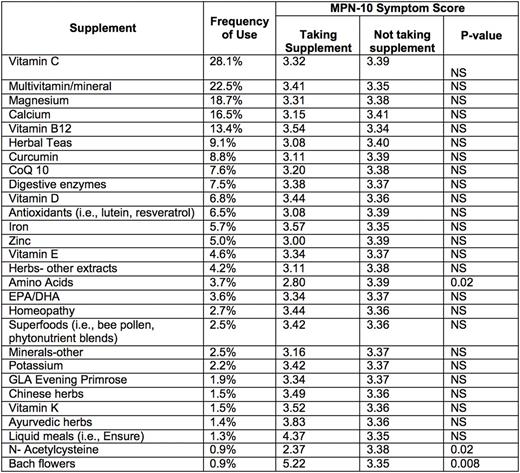Abstract
Background: Some complementary and alternative medicine interventions, namely diets and supplements, have demonstrated antioxidant and anti-inflammatory pharmacological properties such as decreased inflammatory markers and reactive oxygen species (Biofactors 2013, J Am Coll Cardiol. 2004, Adv Nutr. 2015). Myeloproliferative neoplasm (MPN) patients have increased inflammatory cytokines (e.g., IL-1, IL-6, IL-8, and TNF-a) that contribute to symptom burden (e.g., fatigue, pruritus, night sweats, bone pain) and nutritional deficiencies (e,g., hypocholesterolemia, hypoalbuminemia, weight loss). To date no studies have evaluated the habits, needs, and preferences of these specific interventions among an MPN population.
Methods: An internet-based survey was hosted by the Mayo Clinic Survey Research Center and promoted on multiple MPN-focused Internet websites and communities during February of 2017. The survey included data on demographics, MPN characteristics, nutritional habits, supplement use, and symptom burden using the MPN-10 (JCO 2012). T tests and chi square tests compared group means and frequencies, respectively. Statistical significance was defined as P values < 0.05.
Results: Demographics : 1329 international MPN patients responded to the online survey of which 24% were diagnosed with MF, 37% with PV, and 38% with ET. 1131 respondents consented to the survey, completed >10 multiple choice questions, and were age 18 years or older. Respondents represented individuals with an MPN diagnosis from 37 countries. Average MPN-SAF TSS score was 31 (SD=17).
Nutritional Education Preferences : Overall, 34% of respondents endorsed using diet to help control their symptoms or MPN disease. 23% of respondents endorsed having food allergies or intolerances. 31% of individuals followed a specific diet or had dietary restrictions. The vast majority (96%) of MPN respondents endorsed being willing to eat only certain foods if it helped to control symptom burden and or could help their MPN to stabilize or reduce the risk of their MPN getting worse (98%).
Supplement Use : 72% of MPN respondents reported use of over the counter supplements. MPN-10 symptom scores were compared for specific supplements between users and non-users (Table 1). Supplement use was significantly more common among females (74%) than among males (66%, p=0.01). Supplement users were significantly more likely to be older (mean age 59 versus(vs) 56 years old, P <0.001) with lower self-reported body mass index (mean 25.7 vs 26.6, P=0.02), and higher frequency of engaging in at least 30 minutes of physical activity (mean of 4 days vs 3 days per week, P=0.04).
Symptom Burden Associations : Intake of alcohol (<0.0001), baked foods (0.02), dairy (0.02), and pasta (0.02) was associated with significantly lower TSS when analyzed as a continuous variable based on frequency of intake over an average week. Fast food (0.0007), pre-made snacks (0.03), soda (<0.0001), refined sugar (0.01), and taco (0.03) intake was associated with worsened symptom score. Symptom burden was significantly lower among individuals using amino acid supplements (2.8 vs 3.4, P=0.02) and N-Acetylcysteine (2.4 vs 3.4, P=0.02) and significantly higher in individuals taking Bach flowers (5.2 vs 3.4, P=0.008).
Conclusions: Few low risk interventions are available which improve symptom burden among MPN patients with indolent disease. Supplement use and nutritional alteration have the potential to be paired with standard therapy to allow MPN patients to self-manage symptom burden and possibly reduce disease-related inflammation. The results of this analysis will be used to inform the further investigation of diet and supplement use among MPN patients.
Mesa: Ariad: Consultancy; Galena Biopharma, Inc.: Consultancy; Novartis Pharmaceuticals Corporation: Consultancy; Gilead Sciences, Inc.: Research Funding; Promedico: Research Funding; Celgene Corporation: Research Funding; Incyte Corporation: Research Funding; CTI BioPharma Corp.: Research Funding.
Author notes
Asterisk with author names denotes non-ASH members.


This feature is available to Subscribers Only
Sign In or Create an Account Close Modal